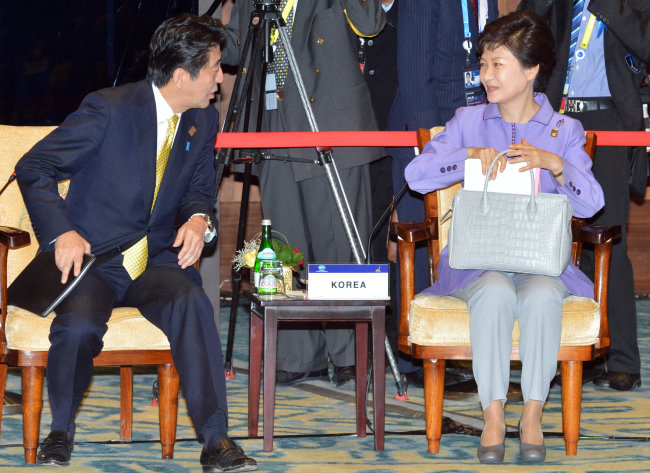APEC leaders to push free trade
Leaders adopt declaration extending commitment to avoid protectionism
By 윤민식Published : Oct. 8, 2013 - 18:33

BALI, Indonesia –- The leaders of 21 Asia-Pacific countries on Tuesday agreed to extend their “standstill commitment” against protectionism until the end of 2016, while reaffirming their pledge to roll back trade-distorting factors.
In a joint declaration, they also reaffirmed that they will push for a comprehensive, high-level regional free-trade bloc called “Free Trade Area of the Asia-Pacific.”
“We will continue our collective commitment to strengthening and deepening regional economic integration and to eliminating barriers to international trade and investment in the region,” the declaration announced at the close of the two-day Asia-Pacific Economic Cooperation summit in Bali, Indonesia.
“We will pursue greater connectivity to break new ground, help economies to create better quality and more productive jobs and marshal purposeful partnerships for the future.”
While recognizing that the region’s economy had outperformed the rest of the world, the leaders cautioned against the ongoing pressure to raise new trade and investment barriers amid a sluggish global economic recovery.
To counter the pressure, the leaders agreed to extend their standstill policy of voluntarily refraining from any moves that would have an adverse impact on trade even if they did not violate WTO rules.
Separately, the leaders adopted another declaration underscoring the APEC’s support for the success of a ministerial-level meeting of the World Trade Organization to be held in Bali in December.
At the meeting, participating countries are to move forward their deadlocked negotiations on the Doha Development Agenda, a WTO initiative aimed at lowering trade barriers across the world.
Launched in 2001, the DDA talks have made little progress due to differences between developed and developing countries over agricultural and industrial tariffs, and other sensitive issues.
“We recognize that Doha is at an impasse. We are now at the 11th hour to put the negotiating function of the WTO back on track. Thus, the next step we take will be critical to the multilateral trading system and the role of the WTO,” said the declaration.
“We acknowledge the urgency to achieve successful outcomes at MC9 (the ninth ministerial conference) which would be a stepping stone to future progress in the DDA negotiations post-Bali and further multilateral trade liberalization.”
Throughout the APEC summit, enhancing regional connectivity has been a central agenda item. The APEC has been exploring ways to enhance connectivity on three pillars -- physical, institutional and people-to-people connectivity.
The main declaration underscored the importance of connectivity, particularly in the physical realm for a more efficient flow of goods, services, capital and people in the region.
To strengthen physical connectivity, the leaders committed themselves to cooperate through a multi-year plan on infrastructure development and investment, which has been proposed by Indonesia. The plan seeks to promote public-private partnerships and enhance coordination in preparing, planning, prioritizing, structuring and executing infrastructure projects.
On this issue, President Park Geun-hye pledged to share South Korea’s development know-how and strategy to enhance its physical connectivity, especially through high-tech information technology to build and enhance the region’s infrastructure.
By Song Sang-ho
Korea Herald correspondent
(sshluck@heraldcorp.com)





![[Herald Interview] 'Amid aging population, Korea to invite more young professionals from overseas'](http://res.heraldm.com/phpwas/restmb_idxmake.php?idx=644&simg=/content/image/2024/04/24/20240424050844_0.jpg&u=20240424200058)











![[KH Explains] Korean shipbuilding stocks rally: Real growth or bubble?](http://res.heraldm.com/phpwas/restmb_idxmake.php?idx=652&simg=/content/image/2024/04/25/20240425050656_0.jpg&u=)

